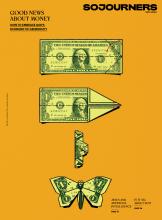EVERY MONTH, TERRY KELLY sends a “rent” check to the Duwamish Tribe on behalf of Quest Church in Seattle, where Kelly serves as senior director of finance.
The church owns the property where it holds services. But the congregation’s monthly payment acknowledges and honors the Duwamish people and other original inhabitants of the land the church occupies, people who have never been “justly compensated for their land, resources, and livelihood,” as the Duwamish “real rent” program puts it.
Members of Quest Church are among the many people of faith who are reimagining the narrative of money in our world today.
The early Christian church was clear in its teachings that money was intended to be used for the benefit of the broader community, not for individual enrichment. But for centuries, and particularly since the Protestant Reformation, the institutional church has more often contributed to ideologies and illusions that reinforce the American form of hypercapitalism. And while money remains a highly visible reality in our everyday existence, our lived stories around money often go uninterrogated.
In America, our views about money tend to be very individualized. We ask questions such as: How is my money going to work for me? Will I have enough to pay bills or retire comfortably? What is my purchasing power? Even the story churches tell is often limited in scope, reduced to teaching about tithes, offerings, building funds, and missions giving. In some instances, we might see positive moves around personal budgeting and reducing debt. But church conversations about money are often left in the realm of personal finance.
Read the Full Article

